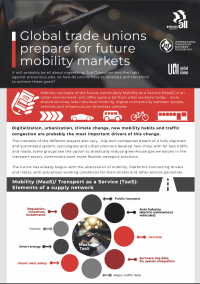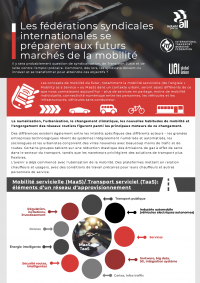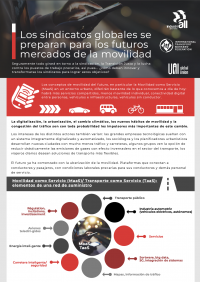17 March, 2022It will probably be all about organizing, Just Transition and the fight against precarious jobs, so how do unions have to innovate and transform to achieve these goals?
 |  |  |
Mobility concepts of the future, particularly Mobility as a Service (MaaS) in an urban environment, will differ quite a bit from what we know today - more shared services, less individual mobility, digital connectivity between people, vehicles and infrastructure, driverless vehicles.
Digitalization, urbanization, climate change, new mobility habits and traffic congestion are probably the most important drivers of this change. The interests of the different players also vary - big tech companies dream of a fully digitized and automated system, sociologists and urban planners develop new cities with far less traffic and roads, some groups see the option to drastically reduce greenhouse gas emissions in the transport sector, commuters want more flexible transport solutions.
The future has already begun with the uberization of mobility. Platforms connecting drivers and riders, with precarious working conditions for their drivers and other service personnel.
Starting with a webinar on 22 November 2021 IndustriALL Global Union, the International Transport Workers’ Federation and UNI Global Union, embarked on a three-year project in close cooperation with German Friedrich Ebert Foundation (FES) to find out what trade union strategies are required to ensure decent working conditions and pay in in the future.
The webinar, which brought together more than 100 trade unionists and experts from 31 countries from around the globe, was an ideal start the exchange between trade unions from a large range of sectors linked to mobility: the automotive industry, public transport, coach drivers, taxi drivers, call centers, ride hailing services, business service centers and many more. In general, everyone agreed that it is high time for unions to engage in the topic on the global level and to develop joint demands and strategies.
Discussions mainly centered on three questions:
1) What role will large tech companies play on future markets and what regulations are required to ensure a level playing field between the different market players, and to secure workers’ rights and decent working conditions and pay?
2) How to develop a supply-network approach to enable a fruitful and effective cooperation between unions from all angles of the future mobility sector?
3) How to apply a concept of Just Transition to provide training and support to the existing workforce in order to secure their employability in the future?
Many questions were asked regarding the number and the area of expected job losses, but also related to new jobs. In addition, the expected power relation between the traditional players (auto industry, public transport, taxi services etc.) and the new players (tech companies, service providers etc.) was a hotly debated issue. A team of experienced scientists was assigned to develop a related study.
The research will be presented on 17 May, to be debated at a global workshop later in the year, probably end of September.
A gender mainstreaming policy will be applied, as well as the principle of balanced views and inputs from the global North and South. To secure proper implementation, there will be two observers.
